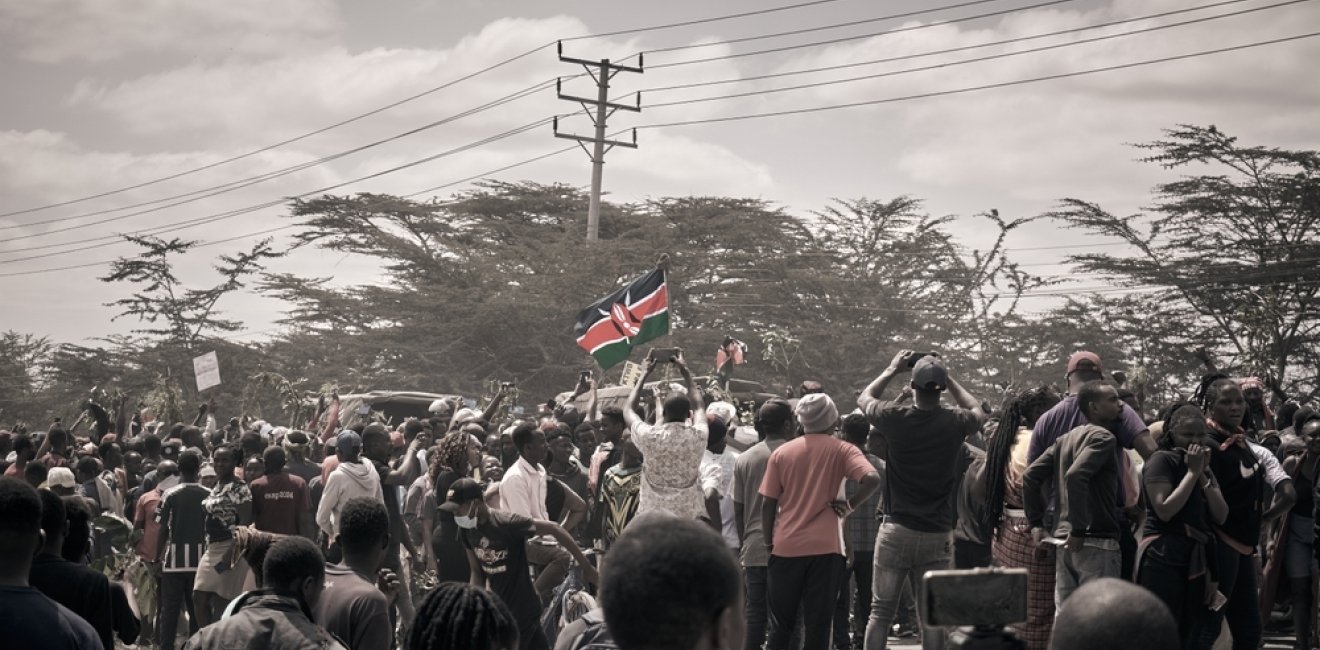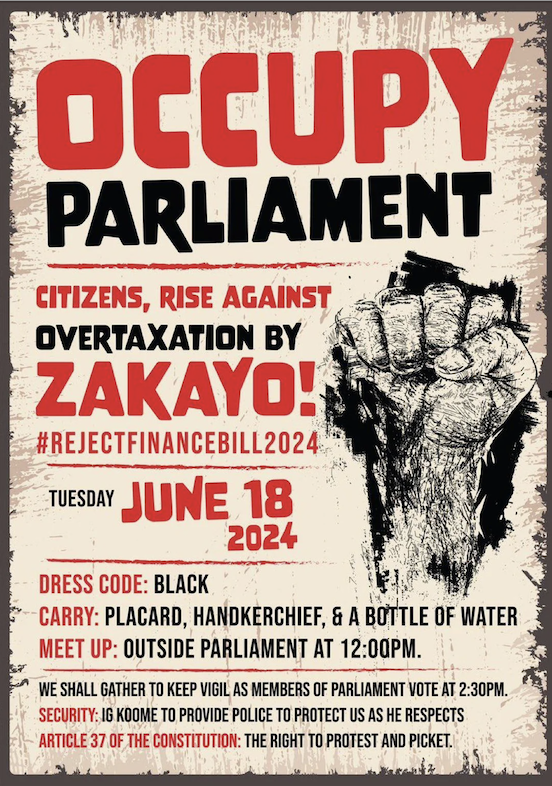The People Have Spoken: African Youth and the Kenyan Finance Bill Protests
Youth-led protests are sweeping across Africa. What does this mean for the future of governance and economic reform on the continent?

A blog of the Africa Program
Youth-led protests are sweeping across Africa. What does this mean for the future of governance and economic reform on the continent?

Starting in June 2024, thousands of Kenyans took to the streets in protest of legislation increasing taxes. The government justified the increased taxation as necessary to pay off government debt. The original Finance Bill proposed raising taxes on items such as bread, financial services, motor vehicles, and more before being amended in the wake of the protests. Yet even after items such as the VAT tax on bread were removed, the protests continued due to the underlying frustrations Kenyans had with the country’s governance and economic situation.
At the forefront of these demonstrations was the younger generation of Kenyans. Labeled the “Gen Z Protests,” young people organized through online platforms like TikTok and X. Hashtags like “#RejectFinanceBill2024” began trending, and photography, videos, and posters shared online increased the movement’s reach. Despite President William Ruto’s decision to reject the bill a week after the protests began, Kenya’s youth have continued to mobilize with new demands like #RutoMustGo in response to police violence against protesters and declining standards of living.
From the outside, it might have been hard to predict the storm of events that have unfolded in Kenya over the past months. In May, U.S. President Joe Biden hosted President Ruto at the White House, calling him “a bright light.” On the international stage, the country has attempted to play a bigger role by sending police officers to lead a peacekeeping mission to Haiti, a nation that has been ravaged by gang violence.
However, resentment has been growing inside Kenya, especially among the youth. The youth unemployment rate stands at 67%, and even those with a university education are struggling to find jobs. The ramifications of President Ruto’s Finance Bill would have increased the cost of living for Kenyans across the country in order to pay off debts. Many young people blame politicians for these problems, whom they view as corrupt and untrustworthy.

The sentiments behind the youth-led protests are not limited to Kenya. Across Africa, demonstrations against the cost of living, corruption, and high unemployment rates are more frequent. In Nigeria, protestors took to the streets at the beginning of August to voice frustrations with the government’s mismanagement of the economy. Inflation in the country has caused food prices to rise, creating discontent among a population already frustrated by the economic reforms that President Bola Tinubu’s government has initiated. As with the protests in Kenya, young Nigerians used social media to rally support for the protests, creating the widely shared #EndBadGovernance tag.
Protests in Uganda over government corruption have also been aided through social media and youth engagement. Like Nigeria, the government has attempted to quash the demonstrations by warning the youth not to participate and detaining protestors. For many young people, there is a feeling that now is the time to hold the government accountable, despite the risks of being arrested or even killed.
The sentiments that led to the protests in Kenya, Nigeria, and Uganda share much in common. Many young people are having difficulties finding jobs and steady sources of income. The debt burden faced by many African governments is making it harder for them to invest in new jobs, leaving many politicians feeling a need to levy taxes in order to gain financial ‘breathing room.’
There is a certain feeling that Africans have been failed by leaders who have promised to improve their country’s economy and tackle the corruption that causes many to lose faith in democracy. In 2022, Ruto’s government withdrew a corruption case against a close ally of his government, prompting backlash from opposition leaders in the country.
Additionally, the impact debt can have on exacerbating the already existing inequalities in African countries can be problematic. Research has shown that debt can place disproportionate financial burdens on those of lower socioeconomic status, making it harder for them to improve their living conditions.
All of this has culminated in the youth-led protests reverberating across the continent. 70% of sub-Saharan Africa’s population is under 30 years old, giving them major potential to be one of the strongest political forces on the continent.
Young people have already shown their active participation in politics at the local level. Participation in community meetings is one of the principal ways that young Africans have engaged in politics, yet there is still more to be wanting in their role at the national level.
In the past, class and ethnic divides have served as obstacles hindering collaboration on the scale recently seen, but it is becoming clear that these differences are no longer the barriers they once were. The failures of African governments have accomplished what very few crises and leaders have been able to do: unite citizens across tribal lines and other divisions in opposition to government policies.
As the rest of the world watches the events unfolding across Africa, it is clear the next generation of Africans has matured into a political force.


The Africa Program works to address the most critical issues facing Africa and US-Africa relations, build mutually beneficial US-Africa relations, and enhance knowledge and understanding about Africa in the United States. The Program achieves its mission through in-depth research and analyses, public discussion, working groups, and briefings that bring together policymakers, practitioners, and subject matter experts to analyze and offer practical options for tackling key challenges in Africa and in US-Africa relations. Read more


